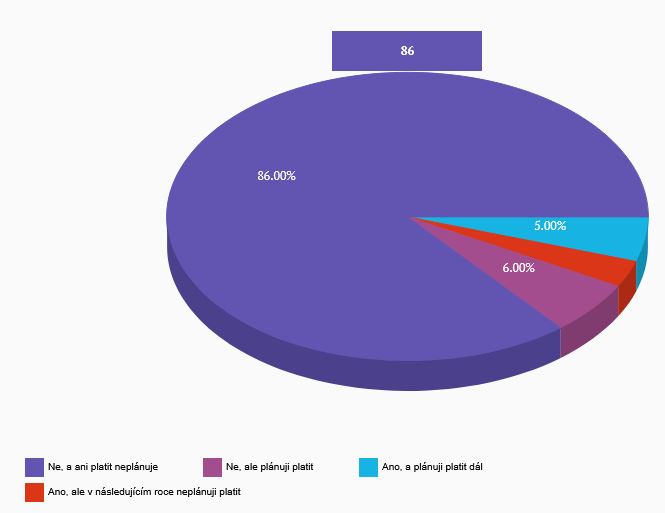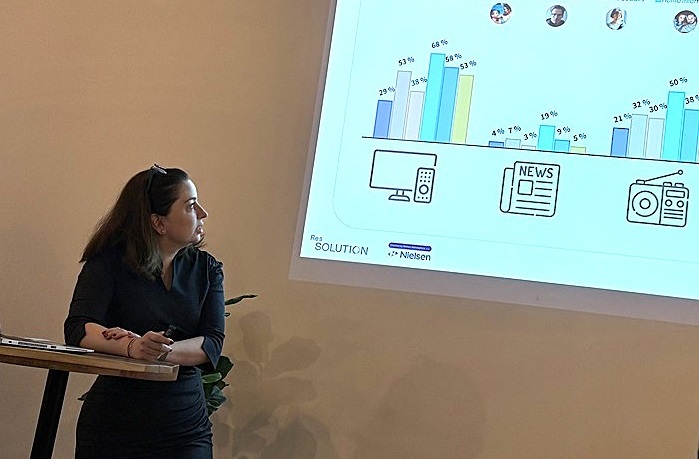Most Czechs are still reluctant to pay for online news. This is according to new data from the study "News in the Age of Media Fragmentation," which was presented on Thursday at a meeting organized by ResSolution Group and Nielsen.
Currently, 8% of people pay for news. This is one percentage point more than in 2020. Another 6% of people do not pay yet, but are considering it. Nevertheless, 86% of respondents admit that they do not pay for news and do not plan to do so. In addition, the vast majority (81%) believe that online news should be freely accessible. This view is more common among women and increases with age.
Experience with paying for online news (%)

People who are willing to pay for news often appreciate higher quality content and also appreciate that the media select topics in advance, which saves them time and makes it easier to navigate the flood of information. On the other hand, the main reasons for not paying for news include its free availability elsewhere and complicated payment methods.
Men, people aged 25–34, and people over 55 are more likely to pay for news. Residents of larger cities and people with higher education are also more willing to pay.
The most common form is a subscription for a specific period (59%), although its popularity has declined compared to the past. Another 22% prefer a voluntary contribution, where they determine the amount themselves. Payment for individual items would be chosen by 13%, but almost half (47%) do not prefer any of these models.
There is a relatively strong consensus on the issue of news financing: 54% of people prefer news to be free and financed by advertising. Approximately one-third (28%) would agree to a combination of free content and a surcharge for premium services, while 18% would welcome a model financed directly by user contributions but without advertising.
Why is interest in news declining?
The study also describes the reasons why news consumption is declining among the domestic population. The results show that up to 26% of the population aged 15 and over currently does not follow any news at all. In the pre-COVID period, this share was only 10%. More than half (53%) of those who do not consume news avoid it completely or deliberately choose only certain forms. The main reasons include lack of interest, the negative emotional impact of the news, and, to some extent, mistrust. Overall, individuals' internal dispositions and external life circumstances also play a role. The study identifies six basic segments based on individuals' predispositions and describes their news consumption patterns.
Trustworthiness and less concern about disinformation
The study also includes information on which information sources people perceive as trustworthy and how concerns about disinformation are developing in Czech society. Here, the researchers found that, compared to the COVID-19 year of 2020, the proportion of those who reported encountering demonstrably false information declined last year. The level of agreement with the statement that "people today are more influenced by emotionally charged information than by objective facts" fell from 72% in 2020 to 64% in 2024. "People are slightly less afraid of disinformation today and more confident in their ability to distinguish between true and false information," said Hana Friedlaenderová, speaking on behalf of the authors of the study.
About the study
The study News in the Age of Media Fragmentation 2024, conducted by ResSolution Group in collaboration with Nielsen, is now in its sixteenth edition. In addition to time series, it offers data on trends in news consumption, social media use, and podcast listening, as well as media audience segmentation, source credibility ratings, and attitudes toward fake news. Data collection took place in 2024 on a representative sample of 1,012 online respondents aged 15 and older. In 2025, the data was updated and expanded to include a qualitative survey.
Source: mediaguru.cz

